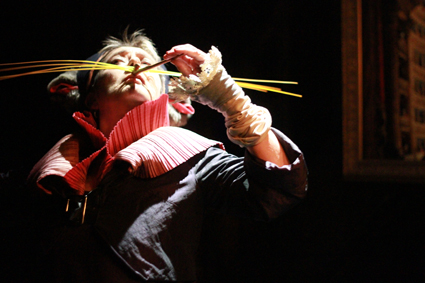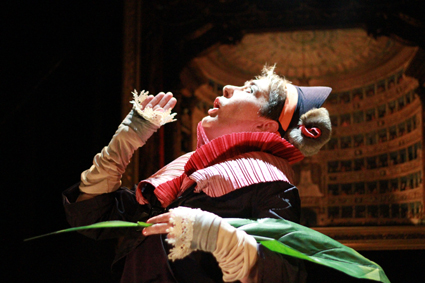The consolations of philosophical theatre
Matthew Lorenzon: Margaret Cameron, Opera for a Small Mammal

Margaret Cameron, Opera for a Small Mammal
photo Daisy Noyes
Margaret Cameron, Opera for a Small Mammal
At La Mama Theatre the audience competes for room with the modest set of Margaret Cameron’s one-woman play Opera for a Small Mammal. We crowd around the edge of the oversized tree-trunk cross-section serving as a stage. Extra seats are squeezed around a plush armchair and a toy piano with such tall legs that it can be played while standing.
Some, like myself, are familiar with Cameron’s work from her collaborations with David Young for Chamber Made Opera; others may have seen her first solo show, Things Calypso wanted to Say! in this same theatre in 1987. A woman dressed as a mouse enters “incognito” in dark shades and a scarf to announce that Regina Josefine del Mouse, the Mouse Queen whose dominion is “the lowercase letters of art,” will “issue a decree on the artistic nature of Matter.” We, “the Mouse People who live in the dark behind the scenes,” are all ears.
What follows may be understood through the literal translation of ‘opera’ as ‘works,’ each of the six scenes of Opera for a Small Mammal being a poem unto itself. Excerpts from Purcell’s The Fairy Queen break up the scenes in which Cameron sniffs, tastes and gorges her way through four centuries of theatre, philosophy, literature and music. The overall effect is a ‘philosophical theatre’ in the sense of the philosophical fiction of Umberto Eco or the philosophical autobiography of American writer and director Chris Kraus. Quotations lifted from Michel Foucault, Gertrude Stein and Hélène Cixous are cited with a footnote, that is, a receptionist’s bell on the floor that is struck with the foot. Alongside del Mouse’s voracious appetite for words are the retiring appetites of a bucolic character from an AA Milne story: a cup of tea, a good sit and a spot of sugar. What may sound like Wind in the Willows for theory nerds is a powerful meditation on the vulnerabilities and passions of the creative animal.

Margaret Cameron, Opera for a Small Mammal
photo Daisy Noyes
Margaret Cameron, Opera for a Small Mammal
Together, the six scenes describe an arc that will resonate at different points with different small mammals in the audience. A light-hearted encounter with the big Other (an elephant, to be precise) leads to a whimsical meditation on the libidinal economy of thought. Then almost without warning the audience is plunged into a free-fall of the soul, past grief and humiliation to land among the ruins of discarded identities. The sense of suffering at this point, as Cameron lies crushed under a weak white spotlight, is unbearable, her horror a cold hand on everyone’s heart.
From the depths of despair, del Mouse makes peace with the consolations of self-fashioning, of “piping” with her tiny, squeaky voice, of “lettering” and of “daubing.” These acts are explained at the toy piano under a single held note, as though music too were a type of writing through which we may “Proceed into a distance We Understand.” Del Mouse’s intellectual appetites have returned, but in a new light born of suffering.
And del Mouse’s appetites come back in force as she strikes out into “the Orchard of the World” to pick the fruit for “Words and Jam.” She carries a basket of books and lemons, gorging upon them as she goes. But what follows this celebration of the fruit of life is a solemn ceremony. Del Mouse, carrying a giant wooden phallus and a basket of electronic candles, defiantly gives her decree before finally leaving the audience holding flickering candles. Too often do we live in bad faith and “abnegate Our Throne” at the word-sniffing, -tasting and -piping head of our bodies. We “cry Victim to inheritance/ Rather than Heir and heiress to the Question of the Dimensionality of Our Being.” Though we may be humiliated by mortality, such abdication is the one true death.
Chamber Made Opera, Opera for a Small Mammal, writer, performer Margaret Cameron, director David Young, sound design, operation Jethro Woodward; La Mama, Melbourne, 4 Dec, 2013
RealTime issue #119 Feb-March 2014 pg. 48






